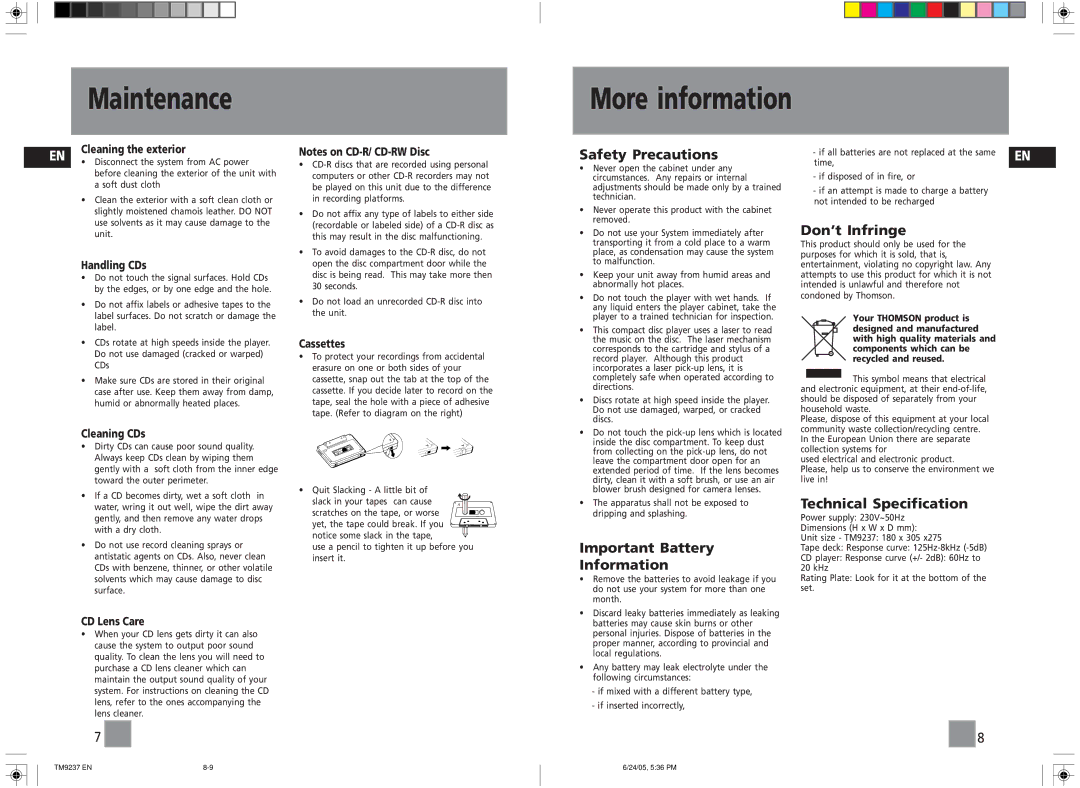
Maintenance
More information
| Cleaning the exterior | |
EN | ||
• Disconnect the system from AC power | ||
| ||
| before cleaning the exterior of the unit with | |
| a soft dust cloth |
• Clean the exterior with a soft clean cloth or slightly moistened chamois leather. DO NOT use solvents as it may cause damage to the unit.
Handling CDs
•Do not touch the signal surfaces. Hold CDs by the edges, or by one edge and the hole.
•Do not affix labels or adhesive tapes to the label surfaces. Do not scratch or damage the label.
•CDs rotate at high speeds inside the player. Do not use damaged (cracked or warped) CDs
•Make sure CDs are stored in their original case after use. Keep them away from damp, humid or abnormally heated places.
Cleaning CDs
•Dirty CDs can cause poor sound quality. Always keep CDs clean by wiping them gently with a soft cloth from the inner edge toward the outer perimeter.
•If a CD becomes dirty, wet a soft cloth in water, wring it out well, wipe the dirt away gently, and then remove any water drops with a dry cloth.
•Do not use record cleaning sprays or antistatic agents on CDs. Also, never clean CDs with benzene, thinner, or other volatile solvents which may cause damage to disc surface.
CD Lens Care
•When your CD lens gets dirty it can also cause the system to output poor sound quality. To clean the lens you will need to purchase a CD lens cleaner which can maintain the output sound quality of your system. For instructions on cleaning the CD lens, refer to the ones accompanying the lens cleaner.
7 ![]()
![]()
Notes on
•
•Do not affix any type of labels to either side (recordable or labeled side) of a
•To avoid damages to the
•Do not load an unrecorded
Cassettes
• To protect your recordings from accidental erasure on one or both sides of your cassette, snap out the tab at the top of the cassette. If you decide later to record on the tape, seal the hole with a piece of adhesive tape. (Refer to diagram on the right)
| A |
|
| A | A |
60 | A |
|
• Quit Slacking - A little bit of |
|
|
|
|
slack in your tapes can cause | A | |||
scratches on the tape, or worse |
|
|
|
|
|
|
|
| |
|
|
|
| |
yet, the tape could break. If you |
|
|
|
|
|
|
|
| |
notice some slack in the tape, |
|
|
|
|
use a pencil to tighten it up before you insert it.
Safety Precautions
•Never open the cabinet under any circumstances. Any repairs or internal adjustments should be made only by a trained technician.
•Never operate this product with the cabinet removed.
•Do not use your System immediately after transporting it from a cold place to a warm place, as condensation may cause the system to malfunction.
•Keep your unit away from humid areas and abnormally hot places.
•Do not touch the player with wet hands. If any liquid enters the player cabinet, take the player to a trained technician for inspection.
•This compact disc player uses a laser to read the music on the disc. The laser mechanism corresponds to the cartridge and stylus of a record player. Although this product incorporates a laser
•Discs rotate at high speed inside the player. Do not use damaged, warped, or cracked discs.
•Do not touch the
•The apparatus shall not be exposed to dripping and splashing.
Important Battery
Information
•Remove the batteries to avoid leakage if you do not use your system for more than one month.
•Discard leaky batteries immediately as leaking batteries may cause skin burns or other personal injuries. Dispose of batteries in the proper manner, according to provincial and local regulations.
•Any battery may leak electrolyte under the following circumstances:
-if mixed with a different battery type,
-if inserted incorrectly,
-if all batteries are not replaced at the same time,
-if disposed of in fire, or
-if an attempt is made to charge a battery not intended to be recharged
Don’t Infringe
This product should only be used for the purposes for which it is sold, that is, entertainment, violating no copyright law. Any attempts to use this product for which it is not intended is unlawful and therefore not condoned by Thomson.
Your THOMSON product is designed and manufactured with high quality materials and components which can be recycled and reused.
This symbol means that electrical and electronic equipment, at their
Please, dispose of this equipment at your local community waste collection/recycling centre. In the European Union there are separate collection systems for
used electrical and electronic product.
Please, help us to conserve the environment we live in!
Technical Specification
Power supply: 230V~50Hz Dimensions (H x W x D mm):
Unit size - TM9237: 180 x 305 x275
Tape deck: Response curve:
CD player: Response curve (+/- 2dB): 60Hz to 20 kHz
Rating Plate: Look for it at the bottom of the set.
![]()
![]() 8
8
EN
TM9237 EN |
6/24/05, 5:36 PM
